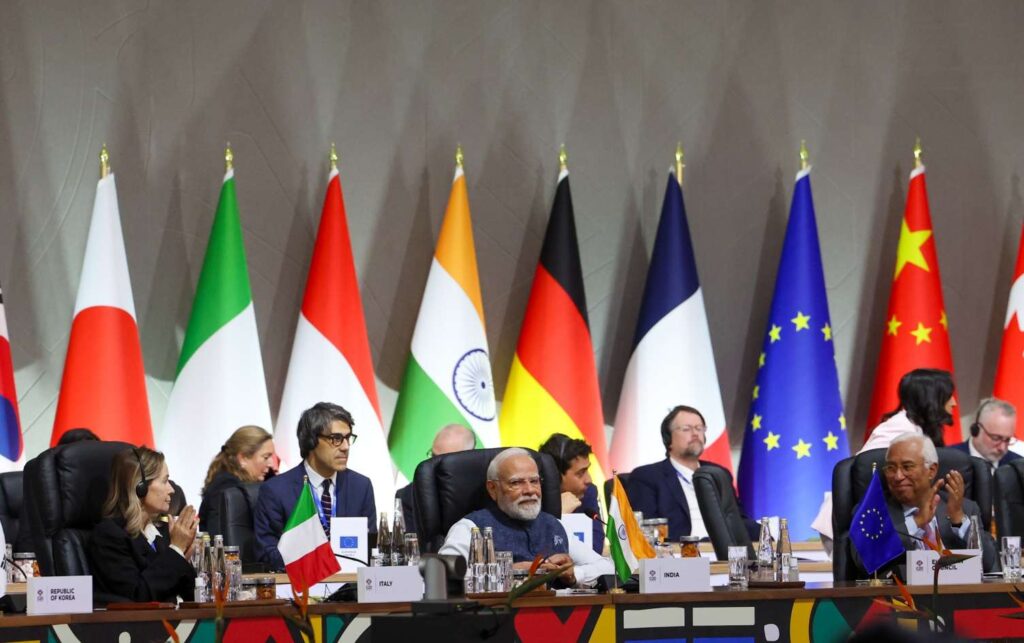Prime Minister Narendra Modi shared an overview of his ongoing visit to Johannesburg for the G20 Summit, calling his engagements with global leaders productive and forward-looking. He said the first day’s sessions offered valuable opportunities to shape discussions on development, security and global cooperation.
Focus on Sustainable and Inclusive Growth
During his address, Modi stressed that traditional growth models have left many parts of the world behind and placed immense strain on natural resources. He urged G20 members to rethink development through the lens of integral humanism, an approach that sees individuals, society and nature as interconnected parts of the same system.

Four Key Proposals for a Stronger Global Framework
Modi laid out four major initiatives designed to tackle some of the world’s most persistent challenges. He called for a united global effort to dismantle the drug-terror network, describing drug trafficking as a threat to public health and a major source of terror financing. He encouraged G20 nations to reinforce systems tied to finance, security and governance. He also pitched the idea of a global repository of traditional knowledge to protect indigenous wisdom and ensure its long-term preservation. Alongside this, he recommended creating a worldwide health response team capable of rapid action during pandemics and natural disasters.
Empowering Africa Through Skills Development
A strong emphasis was placed on Africa’s growth. Modi introduced the G20–Africa Skills Multiplier Initiative, a long-term plan to train one million certified instructors across the continent. The goal is to strengthen local capacity, create jobs and support long-term economic development through a train-the-trainer model.
Building Resilience Against Natural Disasters
In the summit’s second session, Modi pointed to the growing frequency and severity of natural disasters. He noted that India established the Disaster Risk Reduction Working Group during its G20 presidency in 2023 and welcomed South Africa’s continued attention to the issue. He urged a shift from reactive disaster response to development-based resilience. Linking nutrition, healthcare, sustainable farming and preparedness, he said, is essential for building a stable global system.
Climate Action, Minerals and Clean Energy
Modi introduced the G20 Critical Minerals Circularity Initiative to support global clean energy goals. He said innovations like urban mining, advanced recycling and second-life battery use can reduce supply pressure and support a smoother energy transition.
Using Space Data for Global Development
Promoting broader access to technology, Modi proposed the G20 Open Satellite Data Partnership. The idea is to make satellite data from G20 nations more accessible for agriculture, fisheries and disaster management, especially for countries in the Global South.
Food Security, Millets and Global South Leadership
Modi reaffirmed India’s commitment to food security and climate action, citing its large-scale food and health programmes. He also noted India’s efforts to encourage the use of millets globally. He praised South Africa’s presidency for its focus on skilled migration, the digital economy, AI, food security and women’s empowerment. He said giving the Global South more representation in global decision-making is essential and highlighted the African Union’s inclusion in the G20 as an important step.
Diplomatic Engagements on the Sidelines
Alongside the sessions, Modi held meetings with leaders including Italy’s Giorgia Meloni, Brazil’s Lula da Silva, Malaysia’s Anwar Ibrahim and France’s Emmanuel Macron. This year’s summit was the first to be hosted on the African continent and marked Modi’s fourth official visit to South Africa, underscoring India’s growing ties with the region.
